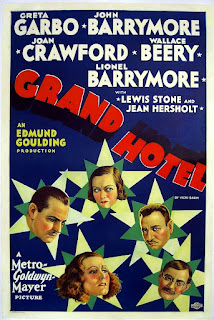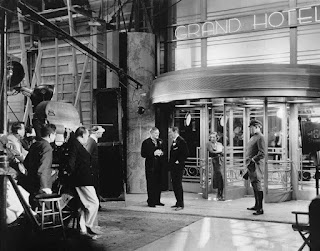Oscars Retrospective: Grand Hotel (5th Academy Awards Review)
Grand Hotel is a bit of an outlier when it comes to Best Picture winners (or Outstanding Production as it was still called at this time). If you go down the catalogue of winners and look at their plots, they’re usually about an outcast who has something to prove (e.g. On the Waterfront (1954), Rocky (1976), Braveheart (1995)), a war movie (e.g. The Bridge on the River Kwai (1957), Patton (1970), Braveheart (1995)), sweeping film epics (e.g. The Godfather (1972), Gladiator (2000), Braveheart (1995)) or a true story about someone who did something amazing (e.g. Gandhi (1982), Schindler’s List (1993), Braveheart (1995)). Grand Hotel is about some people who stay at a hotel at the same time and, yeah, that’s about it.
The film was still revolutionary though. Not in the sense that it had some new camera techniques or had a story that’s never been seen before, no, instead it proved the raw potential of star power in Hollywood. Before this, films were defined by one star who would garner up the leading title, maybe two if they were being generous. For Grand Hotel, the producer, Irving G. Thalberg (one of the most influential producers in Hollywood history and the man responsible for many of the titles mentioned in the early part of this series) had the brilliant idea of having several stars all in one movie.
Thus, Grand Hotel features some of the biggest names in Hollywood at the time: Joan Crawford, Wallace Beery, John Barrymore, Lionel Barrymore, Greta Garbo and Lewis Stone. The apparent though process was that there’s obviously a disconnect between people who are fans of Wallace Beery versus people who are fans of Joan Crawford so this would be a movie that would present something for everyone. The director, Edmund Goulding, would become known in Hollywood circles as “the Lion Tamer,” due to his ability to work with whiny prima donnas such as Joan Crawford and John Barrymore and still churn out a product.
All of the actors each play a character who has their own subplot, setting up a series of several different plots that all interconnect with each other. The film would prove to be such a gigantic success that its style of having several A-listers together while dealing with personal (often petty) issues would become known as “Grand Hotel films.” Hell, the biggest competition at the Oscars that year was one of these films, that being Shanghai Express (a movie that I won’t be reviewing in the Success or Snub section since Grand Hotel came first and did it better).
It’s weird to think that it took this long for someone to come up with the idea of having multiple A-listers all in the same movie, especially since this is the trend that Hollywood projects tend to live and die by. This is where the very idea of an all-star cast began. All this begs the question: are the stars really all there is to Grand Hotel or does it still hold up as an actual movie?
While, as mentioned, there are several subplots, the central story is as follows. The main character is a man known as the Baron (John Barrymore) a.k.a. Baron Felix Bienvenuto Fraheim von Geigen so we’re just going to keep calling him the Baron. The Baron has found himself in a bad place and needs some money so he checks into the Grand Hotel in Berlin to rob a local opera singer named Madam Grudinskaya (Greta Garbo). The Grand Hotel is just like the Hotel California in that you can check out any time that you like but you can never leave. Except you can totally leave if you want to. And it’s an actual place instead of a metaphor. And you’re not losing your soul by staying there.
Anyway, during his stay at the hotel, the Baron meets an entourage of colorful characters such as a self-destructive loser named Kringelein (Lionel Barrymore), an underhanded factory owner named Preysing (Wallace Beery), his seductive stenographer Flaemmchen (Joan Crawford) and a cynical physician named Dr. Otternschlag (Lewis Stone).
Joan Crawford does great as this sort-of lost soul, the Baron is very charming, Dr. Otternschlag is enjoyably miserable but the part I really love in this movie is General Director Preysing. For one thing, Wallace Beery is the only actor who even attempts a German accent. For another, his subplot about him trying to merge two companies is surprisingly fun to watch. The character is such a sleazebag who’ll go to any lengths to get what he wants that it’s hard not to have fun with him.
Probably the most bizarre character is Lionel Barrymore’s performance as Kringelein. The previous year, Lionel Barrymore won the Oscar for Best Actor for his performance of a tragic alcoholic in A Free Soul (1931). Armed with that knowledge, it feels really strange to see him take part in so many instances of bad drunk humor that was an annoying staple of 1930s cinema. Even weirder is that he’s the only character in the movie who seems to have an actual arc. He runs the gamut from being pathetic to annoying to eventually explaining the lesson of the film at the end.
That’s probably the biggest surprise watching Grand Hotel. I was expecting just a fun screwball comedy featuring an all-star cast but there is actually a lesson at the end about learning how to live life to its fullest and appreciate it (holy shit, it actually is like the Hotel California). Each of the characters come to this lesson from their own ends and learn off of each other. It’s actually a little bit smart about it.
The movie is not without its problems, though, and, unfortunately, they’re kinda big ones. First off is that at one point in the film, Kringelein learns about the Baron’s money troubles and offers to bail him out and the Baron refuses for no reason other than he wants to make the money on his own. (It’s not like the offer is one and gone, either; he makes it several times.) While we never find out what exactly is going on with the Baron, what little we do see makes it apparent that he’s fallen in with some pretty scary people and that, if he doesn’t pay them off, his life could be in danger. And he still doesn’t take the money from his friend!
Also, near the end of the movie, the plot takes a pretty sharp turn, leading to a very subdued, philosophical and dark climax, especially given how lighthearted the movie was up to this point. While this isn’t necessarily a bad thing, the incident that sets off this chain of events isn’t well-shot. Like, at all. Like, I had no idea what had happened until the characters straight up told me. 5-10 minutes later.
It’s not even really a case of censorship since the Hays Code still wasn’t in effect yet. Maybe the studio decided to dial back the violence to maximize profit and not show anything that could rile up people’s sensitivities but, whatever the deal was, it’s really jarring to watch.
Going back to the good stuff, Grand Hotel was also a big step forward for production design. This was the first movie to build a fully three-dimensional set. Before this, sets would be built with a hollowed-out fourth wall for the convenience of the camera; here the whole lobby and other rooms were really built as fully fleshed-out rooms. This makes the hotel feel more real and changed the way that sound stages were made going forward. In addition, it’s also a pretty damn cool set. You really get the sense that this is the most lavish and beautiful hotel in the world and the way that the marble glistens in the black and white cinematography is really cool.
The movie was also a big breakout film for Greta Garbo and her character, Grudinskaya, eventually became a bit of an in-joke reflecting Garbo herself. Specifically, her line, “I want to be alone,” became a tagline for Garbo’s own way of dealing with paparazzi and her refusal to share her personal life with the press. It oddly became the most famous line in the movie.
Grand Hotel is one of the most significant films of the first half of the 1930s. Many other films would go on to ape it to try to replicate its success, often garnering the title of Grand Hotel on X. e.g. Grand Hotel on wheels (Stagecoach (1939)), Grand Hotel on a train (Rome Express (1932)), Grand Hotel in a theater (Four Hours to Kill! (1935)), you get the idea. It’s one of the best examples of truly old-school Hollywood and gives a good time capsule of the era.
It ain’t perfect and probably hasn’t aged the best (Lord knows that I was getting bored more than once while watching it) but its influence still can’t be understated. It’s not on the same level of some of the truly greatest films of all time but it still has an impact. If you enjoy older films, it might be worth a watch.
But was it the film of the year?
In case you missed it:
1st Academy Awards (1927/28): Wings/Sunrise: A Song of Two Humans: Part 1, Part 2
2nd Academy Awards (1928/29): The Broadway Melody: Part 1, Part 2
3rd Academy Awards (1929/30): All Quiet on the Western Front: Part 1, Part 2





Comments
Post a Comment